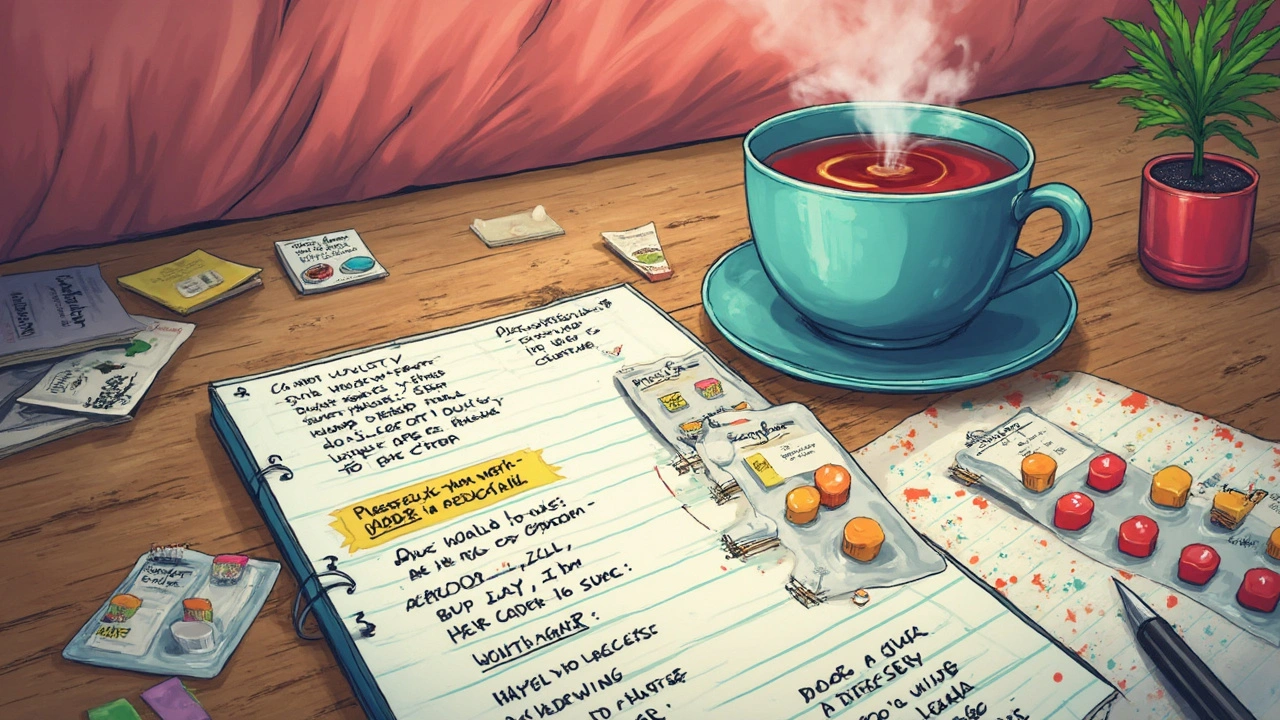Staring at your face in the mirror every day, finding yet another angry red spot, wondering if there’s anything that actually works—ring a bell? For a lot of people who’ve tried every skincare hack, scrub, and cream, Accutane (also called isotretinoin) sits somewhere between ‘miracle cure’ and ‘last resort.’ The stories are wild: some say it gave them perfect skin, others talk about dry lips from the pits of hell. But what’s the real deal with this pill that dermatologists still trust after four decades? Buckle up because we’re going deep—warts, myths, stats, and all.
How Accutane Works and Why Dermatologists Still Recommend It
Accutane isn’t some magical skin vitamin. It’s actually a heavy hitter in the vitamin A family, and it completely changes how your skin works. Basically, it targets the stuff that actually starts acne: oil production, dead skin cells clogging pores, and even the angry bacteria that set up shop under your skin. Instead of just drying out pimples or blasting bacteria like usual creams, it tells your oil glands to chill out—often reducing their output by up to 90% during treatment. Fewer oil factories equal fewer blocked pores and way less acne.
Originally released in 1982, Accutane was first intended for the worst of the worst: extreme, scarring, cystic acne that left people hiding from cameras. But as the years went on, dermatologists started seeing how well it worked for regular stubborn acne—the kind that laughs in the face of prescription creams. Now, plenty of teens and adults use it when nothing else has made a dent, especially since studies have found that about 80% of people who finish a full 16- to 20-week course see clear or almost clear skin at the end—stats you just don’t get from most treatments.
Still, there are rules. Accutane comes with a lot of paperwork, blood tests, and warnings—especially for girls and women who could get pregnant, since it can cause birth defects. The iPLEDGE program in the United States keeps track, requiring pregnancy tests every month and tight prescription controls. This sounds scary, but dermatologists keep recommending Accutane because when used right, it can actually change lives, especially for people with painful, embarrassing acne that triggers depression or isolation.
| Fact | Stat |
|---|---|
| Patients who see significant improvement after Accutane | ~80% |
| Recommended course length | 16-20 weeks |
| Reduction in oil gland activity | Up to 90% |
| Birth defects if taken in pregnancy | ~30% risk |
| Relapse rate within 2 years | About 20-30% |
That 20-30% relapse rate isn’t great, but it’s a lot better than the odds people get stuck with on antibiotics or retinoids. Accutane isn’t for everyone, but for the people who need it, it’s not just a skin fix—it’s freedom.
What to Expect While Taking Accutane—The Good, The Bad, and The Dry
This isn’t a one-and-done pill, and Accutane does not go quietly. Most people are told to expect about 4 to 6 months of daily capsules. Some see their skin get worse before it gets better—a weird purge, where all the hidden pimples and blackheads rush to the surface. This is absolutely normal, even though it’s frustrating (imagine starting a gym routine and getting weaker before you get stronger—same idea).
The most notorious side effect? Dryness. We’re talking Sahara-level lips, nostrils that might bleed, and flaky skin that makes you want to just dunk your face in Vaseline. ChapStick becomes your best friend (bring two, because you’ll lose one), and thick moisturizers go from optional to non-negotiable. Most dermatologists recommend the blandest, thickest stuff out there, like Aquaphor or plain Vaseline for lips, and fragrance-free creams for your face and body. Even your eyes can get dry—so if you wear contacts, get those rewetting drops handy or switch to glasses.
There are other things nobody warns you about: your muscles might feel a little stiffer, your skin might sunburn easier (skip tanning, trust me), and small cuts or scrapes can take longer to heal. For most people, it’s all about managing the dryness and avoiding injury by skipping out on stuff like waxing or harsh exfoliators. Mood changes and headaches come up on warning sheets, but studies haven’t proven a clear link between isotretinoin and depression—though your doctor will ask about mental health at every checkup, just to stay safe.
And, of course, the biggest rule of all: no pregnancy. Not during, not for a month after, not even a little bit, because the birth defect risk is very real. That’s why there are so many tests and reminders. For guys, this isn’t an issue, but birth defects can still happen if a woman taking Accutane becomes pregnant, so it’s taken seriously.

Side Effects, Risks, and Myths You Keep Hearing
The internet is full of Accutane horror stories, memes about crusty lips, and claims it’ll ruin your life (or save it). Here’s the honest scoop. About 90% of people who take Accutane get dry lips and skin—that’s almost guaranteed. About 35% develop some mild nosebleeds from the dryness, and maybe 10-20% will notice their joints or muscles ache a bit. These usually go away when treatment ends.
The scary stuff—severe depression, long-term gut issues, weird hair loss—is a lot less common and hasn’t actually been proven in good studies. For every story of someone who says the drug changed their personality, there are studies showing mental health usually improves as acne clears up. That said, dermatologists take any sign of mood swings very seriously. The digestive side effects, like Crohn’s or IBS, haven’t held up in large-scale reviews, but there is always a tiny risk whenever you take a potent prescription.
- Accutane stays in your system for just a few days after you stop (it’s gone after a month for sure)
- It doesn't “thin your skin” forever. You’ll be back to normal within a few weeks after your last pill
- Hair thinning happens to maybe 5% of users, but it’s almost always reversible
- Scarring risk is lower on Accutane, especially if you hold off on picking or major procedures
- Dry eyes or blurry vision? Happens, but usually clears up when your skin gets less dry
Forget the myth about Accutane ruining your future chances at normal health. People go on to have healthy kids (after waiting a month), play sports, and live totally regular lives. The key is being honest about how you’re feeling during treatment and telling your doctor about any weird symptoms—not hiding them because you’re scared the medicine will get taken away. The monitoring isn't just red tape; it’s there to actually keep you safe.
Tips for Surviving Accutane and Keeping Your Skin (and Sanity) Happy
Let’s be real—nobody wants to walk around with crusty, flaking lips and uncomfortably dry skin. Years of patient hacks (and dermatologist tips) have led to a playbook people now share in forums, TikTok, and group chats. You don’t have to suffer more than necessary.
- Accutane works best with fat in your stomach. Swallow your pill with a meal that includes some healthy fat—like eggs, avocado, or a spoonful of nut butter. Without fat, your body won’t absorb it as well.
- Lip balm: Use a waxy, petrolatum-based balm (Aquaphor or Vaseline again). Keep them everywhere—backpack, pockets, car, desk.
- Moisturizer: Get a heavy, fragrance-free cream (CeraVe, Eucerin, Vanicream) and slather it on after showering.
- Sunscreen: Apply even on cloudy days, because your skin will burn faster. Use a gentle mineral sunscreen, SPF 30 or higher.
- Skip waxing: Your skin will tear. Wait a few months after treatment before any kind of waxing.
- Chill on retinoids and harsh scrubs; stick to mild cleansers.
- If you get dry eyes, try preservative-free drops a few times a day.
- Stay hydrated, inside and out—drink tons of fluids to help with dryness.
- Exercise if you feel stiff, but hold off on ultra-intense workouts if your joints feel sore.
Another often-overlooked tip: take a quick phone photo of your skin before you start and every couple of weeks. Seeing the slow progress will keep you going when it feels like nothing’s happening, or you have a few bad days. And connect with others—there are dedicated groups online where people swap advice, vent about the worst days, and celebrate clear skin wins. No need to struggle alone.

Life After Accutane: Results, Maintenance, and Realistic Expectations
Finishing that last pill is a weird feeling—a mix of relief and anxiety. Now what? Most people get off Accutane and have their best skin since childhood, sometimes for years. In studies, about 70-80% of people don’t need a second course. That said, 20-30% have a relapse within two years. This doesn’t mean your acne will come roaring back, but stubborn breakouts can happen—often milder and easier to manage than before.
Doctors sometimes recommend another round of treatment if the acne is still serious, but usually at a lower dose and shorter course. Others prescribe mild topical retinoids or birth control pills (for women) to keep things under control. Routine skincare stays simple: a gentle cleanser, daily SPF, and moisturizer. Skin can stay slightly drier or more sensitive for a couple months post-treatment, but life usually gets back to normal pretty quickly.
One myth that needs busting: Accutane won’t give you flawless, glass-smooth skin without a single scar or pore. It works wonders, but it can’t fix deep scarring or lingering redness—those need separate treatments like lasers or microneedling, done after your skin has recovered. And the confidence boost? For a lot of people, it stays long after treatment ends: no more dodging photos, worrying about what others see, or endless shopping for miracle lotions that let you down.
The bottom line—Accutane isn’t for everyone. You need commitment, honesty, and a sense of humor to get through the awkward months. For those who brave the journey, the payoff can be bigger than just skin deep. And who knows? You might just become the new lip balm expert in your group chat. At least you’ll finally have a selfie you actually want to share.


Akshay Pure
July 18, 2025 AT 11:22Honestly, Accutane is one of those drugs that people either worship or demonize without really understanding the biochemistry behind it. The retinoid mechanism that reduces sebaceous gland activity is well-documented, yet the general public usually oversimplifies its impressive dermatological efficacy.
It's frustrating how misinformation tends to overshadow clinical evidence — like some folks endlessly repeat myths about permanent liver damage, which isn't accurate if the monitoring protocols are adhered to. This article does a service by clarifying these misconceptions with scientific rigor.
Still, I wonder how well patients absorb this information when dermatologists sometimes rush through the side effect briefings. The neuropsychiatric concerns always get amplified in social media, so a balanced perspective is crucial.
For anyone on isotretinoin, I’d emphasize the importance of consistent bloodwork and open communication with healthcare providers rather than panicking over every supposed side effect.
Matt Stone
July 18, 2025 AT 11:30Okay, so what about the common side effects? Everyone talks about dry skin and lips, but what about stuff like mood swings or headaches? Does the article dig into those 'weird' side effects it mentions?
I'd like a straight answer without the fluff. I don't want to read a bunch of medical jargon when I just want to know what to expect. Some people say it’s miracle drug, others say it ruins their life. Where’s the real truth?
Also, how does Accutane compare to other acne treatments? Anyone know if it’s the last resort or something that should be tried earlier?
Michelle Abbott
July 27, 2025 AT 13:07Yikes. I’ve been on Accutane twice and each time felt like my whole body was in rebellion mode. Let me break this down for those who want the nitty-gritty on side effects and patient experiences.
The dryness isn’t just lips and skin; sometimes your eyes, nose, even genitals can feel painfully dry — it’s no joke. And don’t get me started on the muscle pain that feels like you ran a marathon when you haven't moved much at all.
One tricky part that surprises many is how sensitive you become to sun exposure, making sunscreen a non-negotiable daily ritual. Plus, mental health rides a rollercoaster for some, though it’s debated how much the drug itself contributes.
This article’s promise to discuss weird side effects is refreshing because doctors often downplay these realities. So, yes, it’s a powerful drug, but respect the process.
Heather Jackson
August 2, 2025 AT 01:54Honestly, I’m a bit skeptical about jumping straight to Accutane, even if it’s the golden standard. My sister’s journey was rough, and it felt like the doctors didn't fully prepare her for the emotional rollercoaster. Does the article address how to manage the psychological effects?
The drama with side effects can be a huge barrier—people gotta know what they’re signing up for! Also, are there any tips on how to make the whole experience less brutal? Those little hacks could make a big difference.
It's nice to see them addressing myths because social media is flooded with half-truths and horror stories, but at the same time, hearing real patient voices is crucial.
Doug Farley
August 2, 2025 AT 22:00Another groundbreaking drug from the '70s that's still the best option? Color me surprised. But seriously, does anyone else think the fetishization of Accutane borders on cult-like?
Like, sure it works, but it’s not some magic pixie dust. Heck, you’re literally poisoning yourself to get good skin, and people act like it’s the miracle cure. The article sounds like it’s trying to demystify that, so props, but come on.
Anyone else tired of the saccharine testimonials when the side effects can be brutal? Dry skin isn’t fun; some people lose their minds a bit because it's a lot. Just being brutally honest here.
Jessica Martins
August 3, 2025 AT 08:40The information about myths was particularly helpful for me. As someone who was hesitant about starting Isotretinoin due to fears of lasting damage, it was good to read evidence-based refutations of common misconceptions.
The article balanced the discussion of side effects with reassurance and ways to mitigate risks. I appreciated the inclusion of monitoring recommendations and lifestyle tips to ease the treatment process.
It would be helpful if future updates included more about patient support networks and how mental health professionals can assist during treatment.
Jeremy Olson
August 8, 2025 AT 17:40I found this piece to be well-rounded and factual, which is refreshing considering how much misinformation exists. The explanation of pharmacodynamics and common adverse effects was clear and manageable even for non-medical readers.
Moreover, the emphasis on medical supervision and monitoring is essential because isotretinoin therapy is not something one should take casually.
I commend the article for encouraging open conversations between patients and doctors to avoid unnecessary fear or neglect.
Brenda Hampton
August 9, 2025 AT 10:50I've always been curious about the whole Accutane thing but was too intimidated to ask. This article seems to cover everything, even the weird side effects nobody talks about. Can anyone share their personal stories? Like, what was the weirdest unexpected effect you've experienced?
Also, how do you stay motivated to keep taking it when side effects hit hard? I feel like the mental struggle would be a big hurdle.
Would love to hear some firsthand advice before considering this treatment myself!
Ada Lusardi
August 11, 2025 AT 20:20Omg, I can totally relate to the dilemma of sticking with Accutane despite the terrifying side effects. The dryness, the mood swings, and the fatigue can feel overwhelming at times.
What really helped me was joining an online support community where people share their struggles and victories—that made me feel less alone. Also, keeping a daily journal about my mood and side effects was eye-opening and helped me prepare for doctor's visits.
And guys, don’t underestimate hydrating your skin properly and using gentle, fragrance-free products. My skin feels like a desert otherwise. Hang in there to those going through it, it’s tough but the payoff can be life-changing!
😊Calvin Smith
August 15, 2025 AT 16:47Yeah, all these glorified Accutane takes are hilarious. It’s just a hardcore chemical blitz on your body and skin slapped with a little hope for smooth face at the end. The so-called 'smooth journey' often feels like walking a tightrope over a pit of dry, flaky hell mixed with existential depression.
Still, compared to popping pill after pill of antibiotics with zero guarantee, it’s the lesser evil. Guess it really boils down to what you’re ready to endure to fight your skin demons.
Description of 'weird side effects' makes me wanna ask: how many of you actually noticed stuff so odd it wasn’t mentioned in the drug manual? I’m talking hallucinations or random joint pains that made you question reality.
Scott Davis
August 17, 2025 AT 11:19I think this article does a good job at balancing the pros and cons honestly. From the perspective of someone who’s tried various treatments, Accutane was rough but effective.
It’s not fun or easy, but if you understand what to expect and take good care of yourself physically and mentally, it can really clear up stubborn acne that nothing else touched for years.
Everyone’s experience is unique, so definitely consider your own situation and consult your dermatologist thoroughly before deciding.